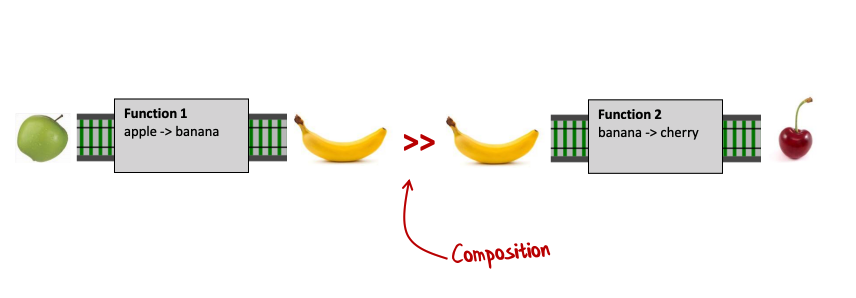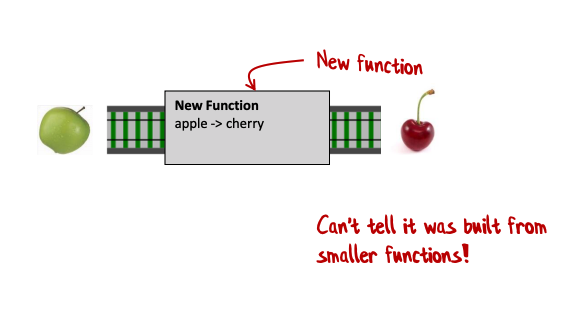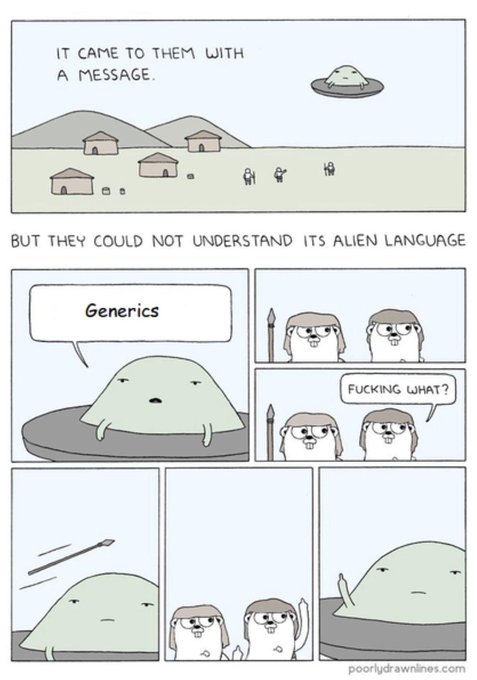class: center, middle # Haskell for fun(ctional) and (no) profit  --- # Goal ## Introduction to functional programming. ## *Programming language shapes Programming thought* > Haskell from zero to hero. NOPE! --- # What's Haskell? - Statically typed - **Purely** functional programming language - Type inference - **Lazy** evaluation - Type classes --- # What's functional programming? - Can't change variable value - Immutable - No 'if' - control flow - No 'for' - loop - *Strong* Static typed - Monad - IO Monad, Category theory, etc ... --- # No, it's not. --- ## Functions are thing (behave like data) - Can bind to variable/symbol - Can use as parameter - HOF - Can use as return value - HOF ### can be used like value --- ## Composite is everywhere !!!!  ---  --- <img height="600px" src="https://dev.jigko.net/slides/haskell-101/pyramid.png"/> --- <img height="600px" src="https://dev.jigko.net/slides/haskell-101/pyramid1.png"/> --- <img height="600px" src="https://dev.jigko.net/slides/haskell-101/real0.png"/> --- <img height="600px" src="https://dev.jigko.net/slides/haskell-101/real1.png"/> --- <img height="350px" src="https://dev.jigko.net/slides/haskell-101/real2.png"/> <img width="800px" src="https://dev.jigko.net/slides/haskell-101/railway.png"/> --- ## Pure function > Same input -> same output > No side-effect ```go var orderCount = 8 func PreOrder(o *Order) error { o.status = "success" // Mutate orderCount++ // Mutate global variable if orderCount > 10 { return errorf.New("sold out") } } func PreOrder(o Order, orderCnt int) (Order, error) { if orderCnt > 10 { return o, errorf.New("sold out") } o.status = "success" return o, nil } func DeleteUser(u User, dbCon *pg.DB) error { dbCon.Delete(u) // Side effect, this one's fine. We need side effect to do something useful. :| dbCon.Close() // Side effect + mutate shared/global variable :( return nil } ``` --- ## Types are not Classes > use Interface / Type class ```java AbstractClass CryptoCurrency { Transaction Transfer(destination string, amount int) // interface } Class Bitcoin extend CryptoCurrency { Transaction Transfer(destination string, amount int) // implementation } Class AccountBase { int GetAccountNounce() // implementation } Class Ethereum extend AccountBase, CryptoCurrency { // multiple inheritance!!! Transaction Transfer(destination string, amount int) // implementation } ``` --- ```go // somewhere type Transferable interface { Transfer(destination string, amount int) (Transaction, error) } // in package 'bitcoin' func (btc Bitcoin) Transfer(destination string, amount int) (Transaction, error) {} // in package 'ethereum' func (eth Ethereum) Transfer(destination string, amount int) (Transaction, error) {} // // How to use it? func Donate (somethingThatTransferable Transferable) (Transaction, error) { somethingThatTransferable.Transfer("ziko", 999) } func main() { tx, err := Donate(FaxBTCWallet) tx, err := Donate(FaxETHWallet) } ``` --- # Pros of Functional programming | |Pure,|Statically typed,|Immutable,| Better func interface | | ------------------- |:------:| ------------:| -------:|----:| | Less bug | Y | Y | Y | Y | | Code Reasoning | Y | Y | Y | Y | | Testing | Y | Y | Y | Y | | Parallel | Y | - | Y | - | | Better reusability | Y | - | - | Y | - Better func interface - no OOP-class-like/inheritance --- # QuickSort in Haskell ```haskell quicksort [] = [] quicksort (headAsPivot:theRest) = (quicksort left) ++ [headAsPivot] ++ (quicksort right) where left = filter (< headAsPivot) theRest right = filter (>= headAsPivot) theRest ``` --- ## Guards an easy way to do branching in functions ```haskell fib x | x < 2 = 1 | otherwise = fib (x - 1) + fib (x - 2) ``` ## Pattern matching Pattern matching is similar. Here we have given three different equations that define fib. Haskell will automatically use the first equation whose left hand side pattern matches the value. ```haskell fib 1 = 1 fib 2 = 2 fib x = fib (x - 1) + fib (x - 2) ``` --- ## Anonymous Anonymous functions are created with a backslash followed by all the arguments. ```haskell (\x -> x + 2) 5 -- 7 ``` ## List comprehension ```haskell [x*2 | x <- [1..5]] -- [2, 4, 6, 8, 10] -- with a conditional [(x,y) | x <- ["a","b","c"], y <- ["red","green", "blue"], not (x == "a" && y == "red")] [("a","green"),("a","blue"),("b","red"),("b","green"),("b","blue"),("c","red"),("c","green"),("c","blue")] ``` --- ## Partial application Partial application: if you don't pass in all the arguments to a function, it gets "partially applied". That means it returns a function that takes the rest of the arguments. ```haskell add a b = a + b addWith10 = add 10 addWith10 5 -- 15 ``` -- Another way to write the same thing ```haskell addWith10 = (10+) addWith10 5 -- 15 ``` --- <img height="600px" src="https://dev.jigko.net/slides/haskell-101/mapreduce.png"/> --- Haskell doesn't have loops; it uses recursion instead. map applies a function over every element in a list ```haskell map (*2) [1..5] -- [2, 4, 6, 8, 10] ``` You can use foldl or foldr to reduce a list ```haskell foldl <fn> <initial value> <list> foldl (\x y -> 2*x + y) 4 [1,2,3] -- 43 ``` This is the same as ```haskell (2 * (2 * (2 * 4 + 1) + 2) + 3) ``` ```haskell filter (\(_,color) -> color=="red") [(x,y) | x <- ["a","b","c"], y <- ["red","green", "blue"], not (x == "a" && y == "red")] -- [("b","red"),("c","red")] ``` --- <img width="800px" src="https://dev.jigko.net/slides/haskell-101/pattern0.png"/> --- <img width="800px" src="https://dev.jigko.net/slides/haskell-101/pattern1.png"/> --- <img width="800px" src="https://dev.jigko.net/slides/haskell-101/pattern2.png"/> ```haskell map anAction aList ``` ---  --- # Polymorphism - Parameteric polymorphism - List, HashMap - Bounded polymorphism - Interface, inheritance --- ## Array manipulate ---